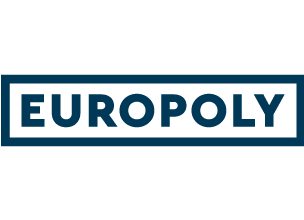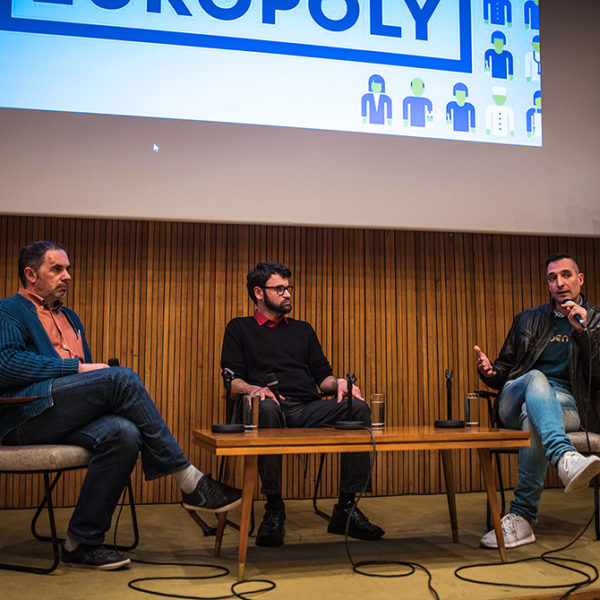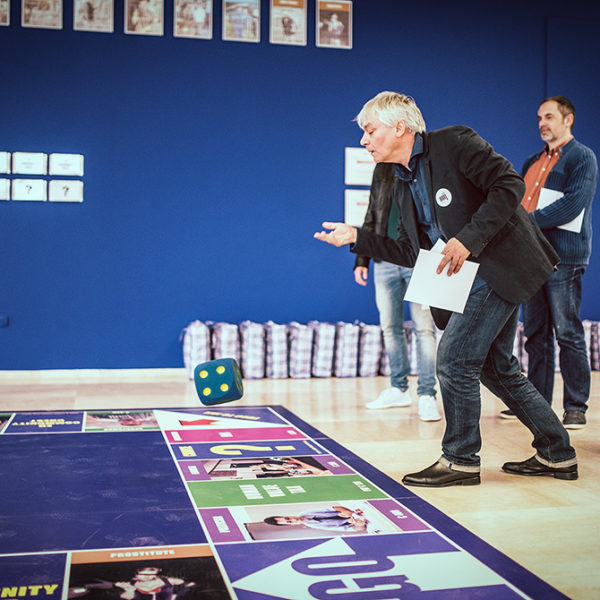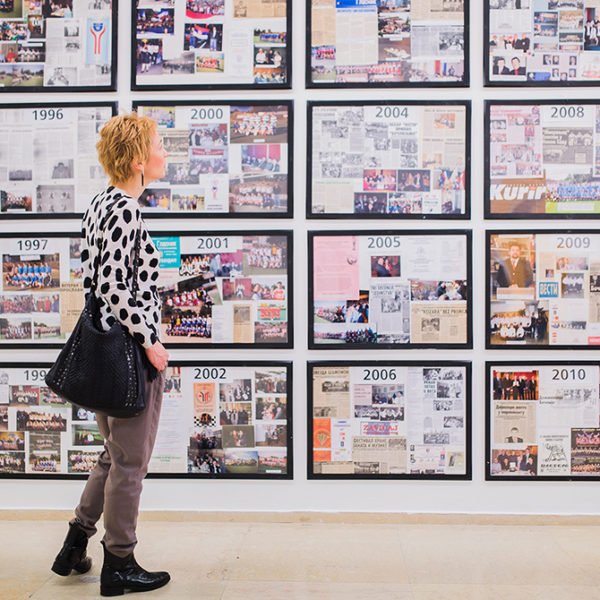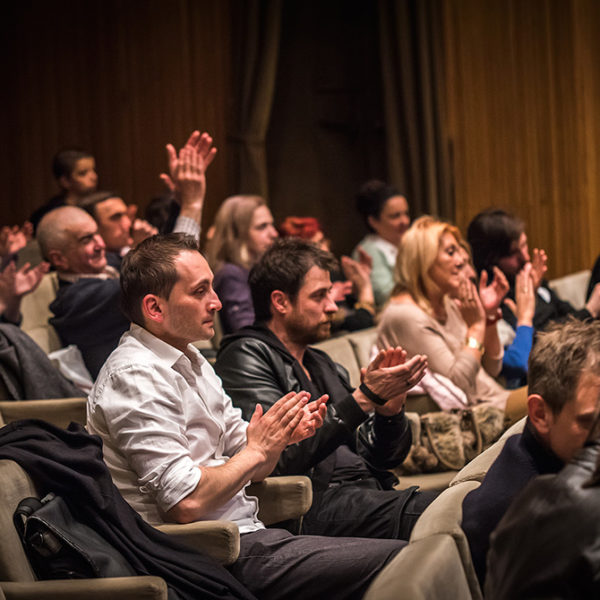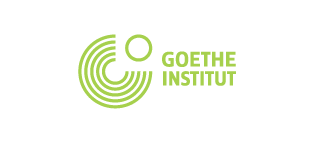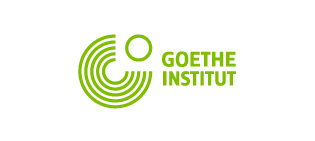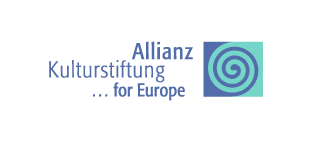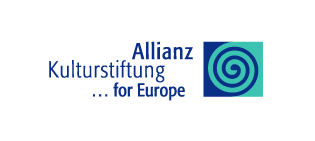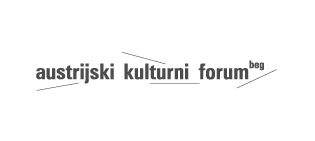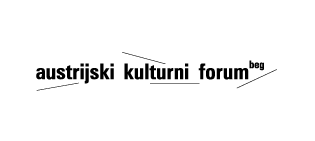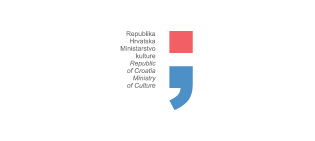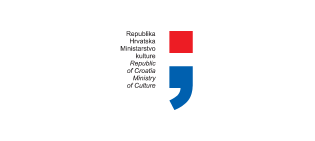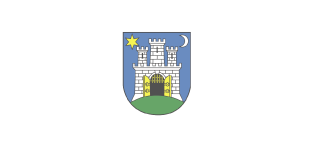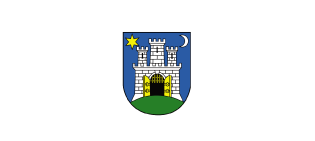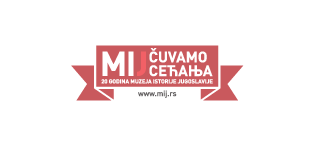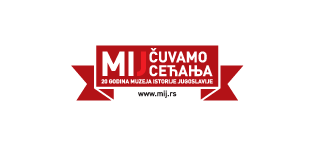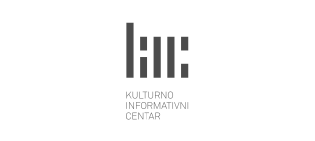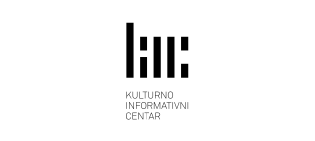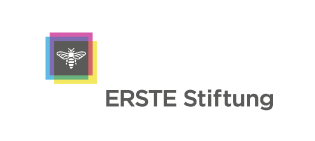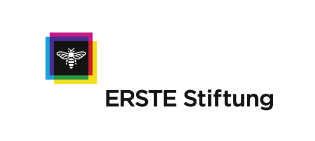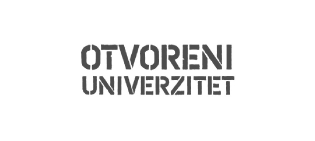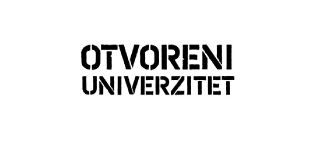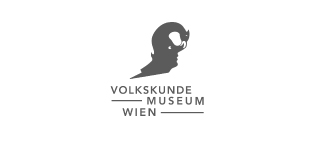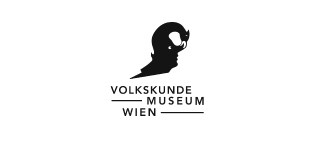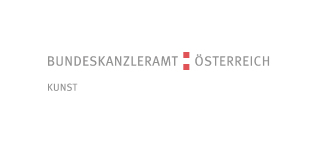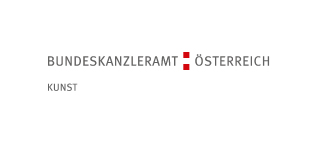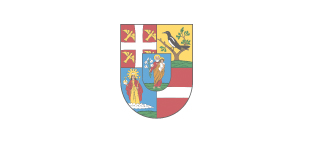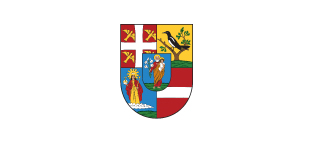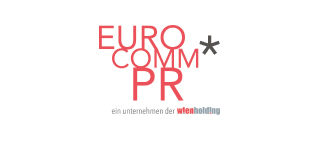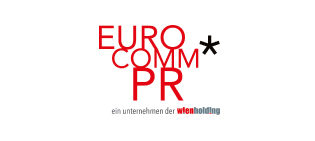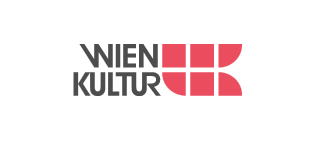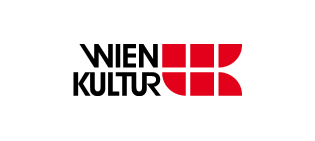Conferences
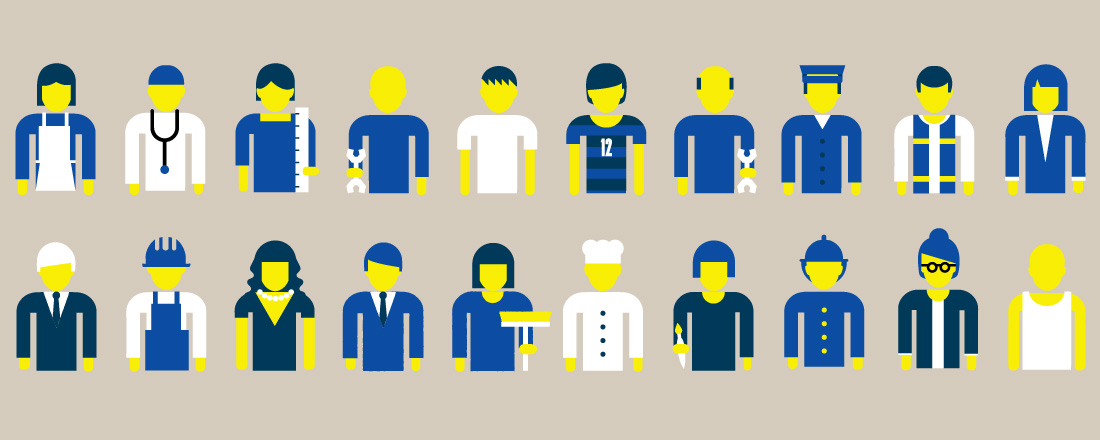
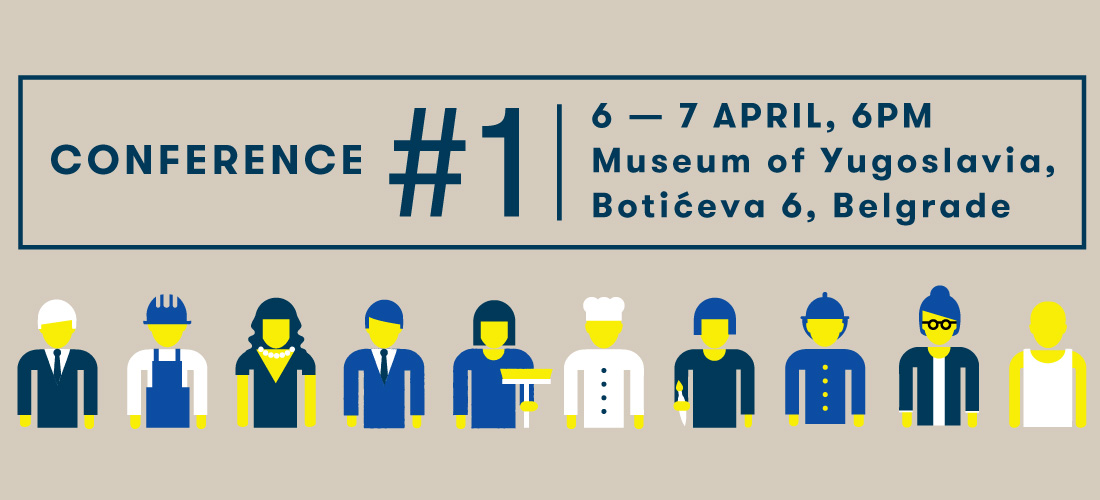
Participants.
Boris Buden, Tatomir Toroman, Želimir Žilnik and Vladimir Ivanović
Moderators.
Ljubica Gojgić, Ivan Velisavljević, Filip Balunović and Ana Otašević
Instalation.
Dejan Kaludjerović
Films.
Želimir Žilnik
The past, present and future of migrations from the Balkans to the countries of central and western Europe!
Thursday, 6 April, 5 pm ‒ Opening Ceremony:
Conference participants Boris Buden, Vladimir Ivanović and Želimir Žilnik will symbolically play the game EUROPOLY ‒ The European Union Identity Trading Game (an art installation from 2004 made in the format of a Monopoly-like social game) by Serbo-Austrian artist Dejan Kaludjerović.
Created in the form of a social game inspired by Monopoly, this piece of work is questioning the position of immigrants in the EU, the very idea of the EU, as well as the gap between the ideal and the practical. Non-EU citizens working in the EU have been photographed and presented in EUROPOLY through their professions. Luck, to a great extent, determines the possible rise or fall of the ’players’ who wish to become part of the EU and acquire new European identity.
The European Union defines European identity as something that is provided only within the Union and only to the European Union citizens, although Europe does not end at the borders of the Union. However, the EU does have the huge power to define European identity, to set up the rules of the game others have to join. The consumer society of the European Union has created a rule that ´everything is for sale’, including even the notions of our identities.
Thursday, 6 April
6 pm ‒ debate: “Jugodojč”
Participants: Tatomir Toroman and Vladimir Ivanović
Moderator: Ivan Velisavljević
7 pm ‒ debate: “Parallel Stories”
Participant: Boris Buden
Moderator: Ljubica Gojgić
8 pm ‒ Film screenings: “Kennedy returns home” and “Kennedy lost and found” by Želimir Žilnik
Friday, 7 April
5 pm ‒ exhibition tour “Yuga, my Yuga – Gastarbeiter stories,” guided by Tatomir Toroman, co-curator of the exhibition, and EUROPOLY conference participants Boris Buden, Vladimir Ivanović and Želimir Žilnik.
6 pm ‒ debate: “Critical Communities in Exile”
Participants: Boris Buden and Vladimir Ivanović
Moderator: Filip Balunović
7 pm ‒ debate: “Future of Migrations”
Participant: Želimir Žilnik
Moderator: Ana Otašević
8 pm ‒ Film screenings: “Unemployed”, “Inventory” and “Fortress Europe” by Želimir Žilnik
Installation EUROPOLY will be on display from 6 ‒ 13 April.
The project is implemented in synergy with the currently ongoing exhibition in the Museum of Yugoslavia, Yuga, my Yuga –Gastarbeiter stories, dedicated to Yugoslav workers who were temporarily employed in Austria and Germany. The exhibition is a part of a broader research project that spans 50 years since the signing of the Agreement about hiring the workforce from Yugoslavia with Austria in 1966, and Germany in 1968.
Conference participants:
Boris Buden ‒ Writer, cultural critic, professor at the Faculty of Art and Design, Bauhaus University, Weimar, Vladimir Ivanović ‒ Historian with research areas in labor and refugee migration from the former Yugoslavia, lecturer at the Humboldt University of Berlin, Department of South-Eastern European History, Želimir Žilnik ‒ Film director, a pioneer of Yugoslav avant garde and experimental film movement who in his work deals with the experiences of immigrants, refugees, returnees.
The project is supported by Allianz Kulturstiftung, ERSTE Stiftung, Federal Chancellery of Austria, the City of Vienna, Austrian Cultural Forum in Serbia, the Ministry of Culture of Republic of Croatia, the City of Zagreb
Partners: Museum of Yugoslavia, Goethe-Institut Croatia, KIC.
Gallery
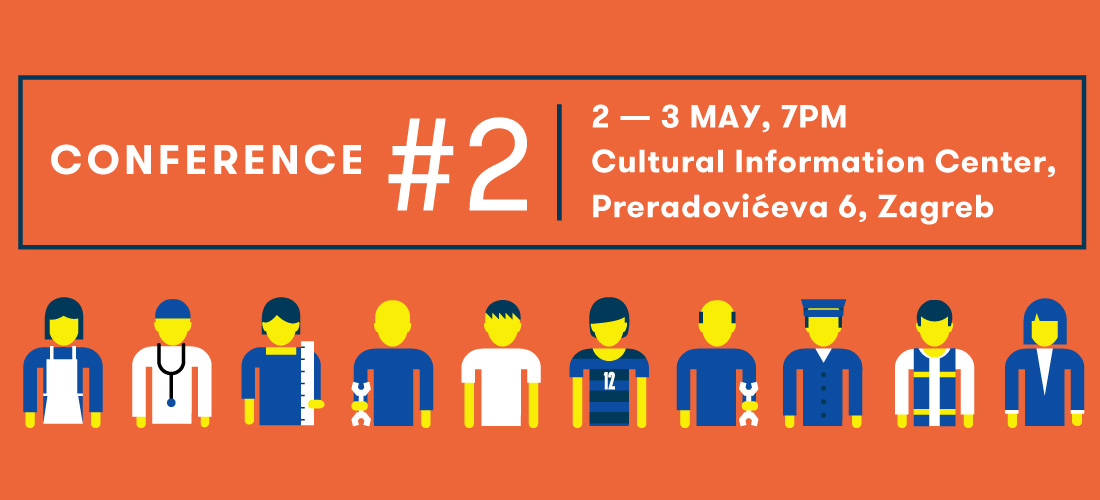
Participants.
Andreja Kalunčić, Tanja Ostojić, Marina Gržinić Mauhler, Viktor Koska and Marijana Hameršak
Moderators.
Bojan Krištofić and Duško Petrović
Instalation.
Dejan Kaludjerović
Video-instalattion: GUESTures: Margareta Kern
Films.
Krsto Papić, Želimir Žilnik, Vladimir Tomić, Lena Muler, Dragan Nikolić, Dragan von Petrović, Rainer Werner Fassbinder and Dušan Makavejev
The past, present and future of migrations from the Balkans to the countries of central and western Europe!
Opening: 2 May 2017, 7 pm
The conference consists of two panels, the first one dedicated to socially engaged art practices critical to the migration and EU cultural policy and the second focused on the policies of identity and migration practices on the (non) imaginary Balkan. Participants of the first panel: Andreja Kulunčić (artist), Tanja Ostojić (artist), Bojan Krištofić (designer and art critic). Participants of the second panel: Marina Gržinić Mauhler (philosopher, theorist and artist), Marijana Hameršak (scientific associate at the Institute for Ethnology and Folklore Research in Zagreb), Viktor Koska (political scientist) and Duško Petrović (anthropologist).
Tuesday, 2 May
19 h ‒ Opening of the installation EUROPOLY ‒ The European Union Identity Trading Game by Dejan Kaludjerović.
Panel: The European multicultural
Participants: Andreja Kulunčić, Tanja Ostojić, Bojan Krištofić
GUESTures | GOSTIkulacije, two channel installation by Margareta Kern, 2011, 33 ‘
Installation EUROPOLY ‒ The European Union Identity Trading Game and video GUESTures will be exhibited until 11. 5. 2017.
Wednesday, 3 May
19 h – Panel: (Non)imaginary Balkans – identity politics and migration practices
Participants: Marina Gržinić, Viktor Koska, Marijana Hameršak, Duško Petrović
Thursday, 4 May
19 h – Halo München, r. Krsto Papić, Yugoslavia, 1968. 12′
The second generation, r. Želimir Žilnik, Yugoslavia, 1983, 88′
21 h – Special trains, r. Krsto Papić, Yugoslavia, 1972, 16′
Undertaker r. Dragan Nikolić, Germany/Serbia, 2013, 53′
Friday, 5 May
19 h – Dragan Wende – West Berlin, r. Lena Müller, Dragan von Petrović, Germany/Serbia, 2013, 87′
21 h – Flotel Europa, r. Vladimir Tomić, Denmark/Serbia, 2015, 72′
Saturday, 6 May
19 h – Katzelmacher, r. Rainer Werner Fassbinder, FR Germany, 1969, 88′
21 h – Montenegro, r. Dušan Makavejev, Sweden/GB, 1981, 96′
Exhibition program:
Art installation EUROPOLY – The European Union Identity Trading Game questions the position of the immigrants in EU, general idea behind the EU, as well as the gap between ideals and practice. Citizens of the non-EU countries, who are working in the EU countries, have been photographed and with their professions are featured in the installation. Luck, to a great extent, determines the possible rise or fall of the players who wish to become part of the new European identity.
The European Union defines European identity as something that is provided only within the Union and only to the citizens of the European Union, although Europe does not end at the borders of the Union. However, the EU does have the power to define identity, the power to set up the rules of a game others have to join. The consumer society of the European Union has created a rule, that ’everything is for sale’, including even notions of identity.
As part of the exhibition program, a video installation GUESTures will be presented. This long-term project by artist Margareta Kern focuses on the overlooked histories of female migrant workers, reflecting the fragmented nature of memory and narrative, and thinking through the radical potential of an artwork as an archive and a memorial to the unsaid and the unheard. The project is dedicated to female migrants who were part of organised mass migration from the socialist Yugoslavia to West Germany in the late 1960s – as the guest workers or Gastarbeiter
Film screenings:
Film screenings consist of eight recent films and cult classics that question the hybrid position of gastarbeiters and migrants in Balkan-European everyday life – from ethnological studies Halo München by Krsto Papić, to the dark humor documentary Dragan – Wende West Berlin by Lena Müller and Dragan von Petrović to the subversive film Montenegro by Dušan Makavejev.
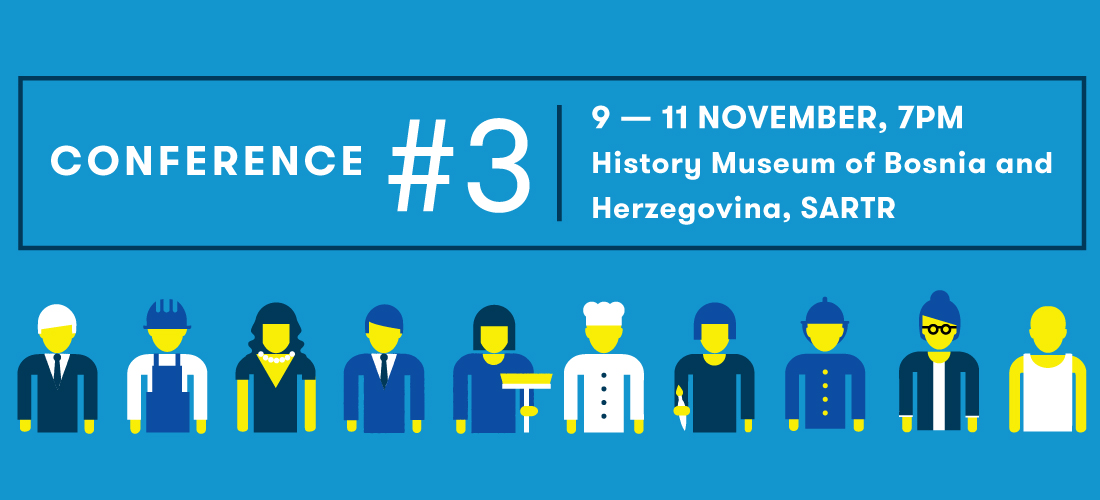
Participants.
Danijela Dolenec and Igor Štiks
Moderators.
Emin Eminagić and Jelena Petrović
Instalation.
Dejan Kaludjerović
Video-instalattion: GUESTures: Margareta Kern
Films.
–
The past, present and future of migrations from the Balkans to the countries of central and western Europe!
9. novembar 2017. u 19 sati
Historijski muzej BiH
Zmaja od Bosne 6, Sarajevo
OTVARANJE 6. OTVORENOG UNIVERZITETA
Otvaranje izložbe
Dejan Kaludjerović: Europoly – The European Union Identity Trading Game
Artist talk: moderatura Jelena Petrović
Trajanje izložbe: od 10. – 18. novembra
11. novembar 2016, 16h
SARTR – Sarajevski ratni teatar
Gabelina 16, Sarajevo
Debata u partnerstvu s Otvorenim univerzitetom
Šta da se radi… s Evropom?
Kriza, nejednakosti i migracije
Uvod i moderatura: Emin Eminagić
Referati: Danijela Dolenec i Igor Štiks
Ulaz slobodan
U Historijskom muzeju BiH 9. novembra u 19 sati, predstavljanjem umjetničkog projekta Europoly – The European Union Identity Trading Game umjetnika Dejana Kaludjerovića, biće otvoren šesti Otvoreni univerzitet pod nazivom Šta da se radi?.
Projekt je izrađen u formatu društvene igre nalik na Monopoly. Rad preispituje položaj imigranata u Evropskoj uniji, kao i samu ideju EU te jaz između ideala i prakse. Građani zemalja koje nisu članice EU a koji rade u zemljama članicama EU fotografisani su i zastupljeni u igri Europoly zajedno sa svojim profesijama. Sreća u velikoj meri determiniše mogući uspjeh ili propast “igrača” koji žele da postanu dio EU i preuzmu novi evropski identitet. Evropska unija definiše evropski identitet kao nešto što se može steći samo unutar EU i što je time rezervisano isključivo za građane Evropske unije, iako se Evropa ne okončava na granicama Unije. Ipak, EU ima moć da definiše identitete, moć da uspostavlja pravila igre kojima se drugi moraju povinovati. Potrošačko društvo Evropske unije stvorilo je pravilo po kojem je “sve na prodaju” uključujući čak i naše identitete. O ovim i drugim temama koje su poslužile kao inspiracija za instalaciju Europoly – The European Union Identity Trading Game s autorom će razgovarati kustoskinja Jelena Petrović.
Instalacija Europoly – The European Union Identity Trading Game
biće postavljena od 10. do 18. Novembra 2017. u Historijskom muzeju BiH.
Posle beogradskih i zagrebačkih konferencija 11. novembra 2017. u 16 sati u Sarajevskom ratnom teatru (SARTR) počinje treći krug Europoly debata. Šta da se radi… s Evropom? Kriza, nejednakosti i migracije naslov je sarajevskog izdanja Europoly debate koja se realizuje u partnerstvu s Otvorenim univerzitetom, ovaj put u formi javne rasprave. Raspravu će moderirati Emin Eminagić, a uvodne referate o sadašnjoj krizi Evropske unije, velikim socijalnim nejednakostima, mjerama štednje, izbjegličkom i migrantskom talasu kao i rastu ekstremne desnice predstaviće Danijela Dolenec i Igor Štiks.
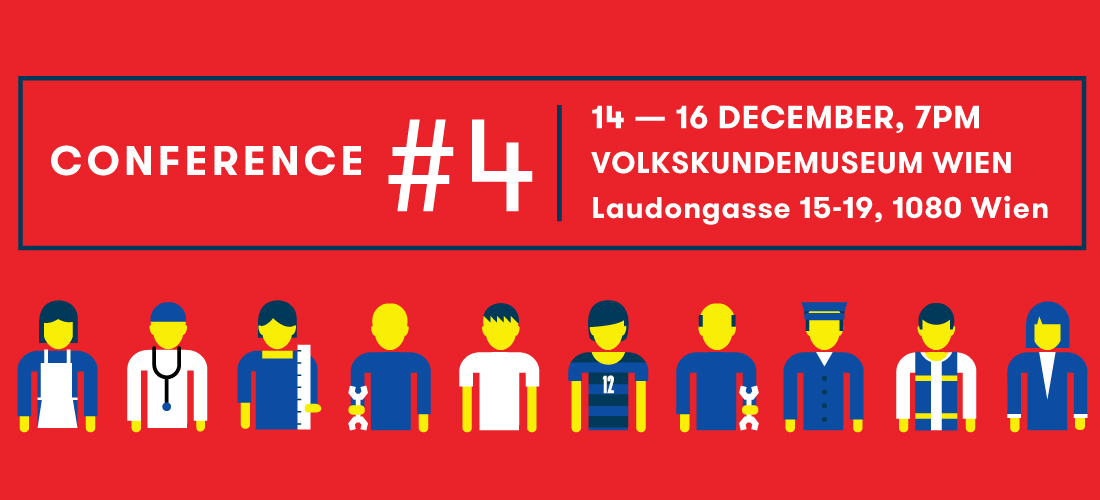
Participants.
Igor Štiks, Karin Liebhart, Nina Brnada, Arash T. Riahi, Philipp Ther, Ulrike Lunacek, Georg Schöllhammer, Iliana Fokianaki, Lana Čmajčanin, Marko Lulić and Nataša Petrešin-Bachelez
Moderators.
Vedran Džihić and Jelena Petrović
Instalation.
Dejan Kaludjerović
Video-instalattion: GUESTures: Margareta Kern
Films.
List of films is soon to be announced.
The past, present and future of migrations from the Balkans to the countries of central and western Europe!
Exhibition opening: 14. December 2017, 7pmEuropoly – The European Union Identity Trading Game by the artist Dejan Kaludjerović
On view: 15. December 2017 ‒ 12. January 2018
Conference:
15. December 2017, 6pm
16. December 2017, 1pm
Film program:
12. January 2018, 5pm
Volkskundemuseum Wien
Laudongasse 15-19
1080 Wien
A fourth multidisciplinary event in the framework of the project EUROPOLY takes place in Vienna, realized in collaboration with four independent organisations – Krokodil (Serbia), Bijeli Val (Croatia), Crvena (Bosnia and Herzegovina) and BLOCKFREI (Austria). The intention of the project is to research and map the intense social, cultural and artistic influence which this long-term wave of migrations made on the West Balkan countries, as well as the countries that mostly represented final migrant destination.
An exhibition, series of regional conferences and film screenings are being held held during 2017 in four cities: Belgrade, Zagreb, Sarajevo, Vienna.
The framework and a starting point of EUROPOLY is the art project EUROPOLY – The European Union Identity Trading Game by the artist Dejan Kaludjerović.
EXHIBITION:
Art project EUROPOLY – The European Union Identity Trading Game is created in the form of a social game inspired by Monopoly. It questions the position of the immigrants in EU, general idea behind the EU, as well as the gap between ideals and practice. Citizens of the non-EU countries, who are working in the EU countries, have been photographed and with their professions are featured in the installation. Luck, to a great extent, determines the possible rise or fall of the players who wish to become part of the EU and acquire new European identity. The European Union defines European identity as something that is provided only within the Union and only to European Union citizens, although Europe does not end at the borders of the Union. However, the EU does have the power to define identity, the power to set up the rules of a game others have to join. The consumer society of the European Union has created a rule, that ’everything is for sale’, including even notions of identity.
The exhibition is on view until 12. January 2018.
CONFERENCE:
Day I: Friday, 15. December 2017, 6pm
“We Refugees” – this is how Hannah Arendt titled her small piece published in 1943 in The Menorah Journal. Arendt’s “We refugees” goes deep into the tissue of our time: Our societies, the face of today’s Europe, our lives, are changing rapidly. If the very introspective act of imagining oneself as a refugee is made impossible, furiously rejected as “Gutmensch”-utopia and seen as dangerous for “our societies”, what are the consequences for solidarity within our societies? The sudden move from “Willkommenskultur” in Germany and Austria in 2015 to “politics of fear and walls” of today stands for a structural change of preconditions for livable life. Judy Butler’s term “livable life” points at the life that can be lived, a normal life that has to go beyond the minimal requirements for a mere survival. The boundaries of livable life for vulnerable parts of our populations today are marked by nationalism, xenophobia, exclusion and segregation. Particularly refugees and migrants have become the new “others”, the embodiments of the fear from every kind of insecurity in the future, our fears. (Zygmunt Bauman) Our imagined “vulnerability” is played against the second-class vulnerability of the other that we fear. This is the new constellation haunting the vision of open and democratic Europe. The discussion in two panels of the first day will dig deep into this new constellation.
The first panel will trace the “We refugees” claim throughout the history, look back to learn about the (possible) future. Do we need to reconsider and re-think the usual notions about Balkanese migrations to Austria? Have the vulnerabilities of the past been transformed into new modes of (multiple) belongings today, of “livable life”? Questions arising from today’s perspective will be the permanent link between the first and the second panel: What happens with spaces for freedom, and ultimately for livable life of all under the new constellations of “fear and walls”? What are the consequences of the politics of fear? And finally, is not the vulnerability of today’s European vulnerable – of refugees, migrants, and dispossessed – our own vulnerability? Exploring the horizon of Europe of “livable life” will be the ultimate utopian goal of the first day discussions.
“We, refugees?” – (Un)livable life of vulnerable
Introduction and moderation: Vedran Džihić (Vienna) – politicologist, researcher
6pm – Part I: Looking back to see the future: Austria and Western Balkans tied by history, and culture and migration? Exploring old and new modes of belonging
Participants:
Igor Štiks (Edinburgh/ Belgrade) – philosopher, writer
Karin Liebhart (Vienna) – politicologist
Nina Brnada (Vienna) – journalist
8pm – Part II: EUROPOLY – GLOBOPOLY: Refugees and migration in the European focus – Constellations of (non)belonging and fear
Participants:
Arash T. Riahi (Vienna) – filmmaker
Igor Štiks (Edinburgh/ Belgrade) – philosopher, writer
Philipp Ther (Vienna) – historian
Ulrike Lunacek (Vienna) – politician, MEP
Day II: Saturday, 16. December 2017, 1pm
Exhausted (Art) Geographies – After many theoretical, practical and political attempts to define geopoliticality of the contemporary art, especially after the fall of communism in Eastern Europe, we faced with an impossibility to define the politics of geographical location outside the global map of the neoliberal distribution of power. Using different means of diversifications, the old one such as: colonial, capitalist and patriarchal mechanisms of social and geographical (re)production and the new one such as: technological, scientific and (techno)cultural methods of social and territorial identification our global world became the geopolitical location where the majority of people doesn’t belong. Inhuman chains of migrations back to back with catastrophic climate changes are ultimate geopolitical exposures of new social class structure within the neoliberal globality in the age of the permanent war. Many artistic practices, theories, exhibitions and critics are a political display of such exhausted geographies or by other words, geopolitical zones of discomfort which refuse to be mobilized for territorial, national, ethnic, religious, economic or other geographies which create the politics of global domination and (post)human exploitation. Starting from those attempts to refuse and to resist to the geopolitics of the present, as well of from the impossibility to step out of perpetuating geopolitical past, those two panels will discuss geographies in conflicts i.e. exhausted geographies and its material limits enacted by political, economic, climatic and epistemic violence of today’s global map shaped by neoliberal distribution of power.
Exhausted (Art) Geographies
Introduction and moderation: Jelena Petrović (Belgrade/Vienna) – art researcher and curator
1pm – Part I: Geopolitical art-zones and its discontents (Discussion on art economy and its geopoliticality)
3pm – Part II: Future Geographies (Discussion on possible futures: an art world beyond the neoliberal geography)
Panel I/Panel II Participants:
Georg Schöllhammer (Vienna) – editor, author, and curator
Iliana Fokianaki (Athens/Rotterdam) – writer and curator
Lana Čmajčanin (Sarajevo/Vienna) – artist
Marko Lulić (Vienna) – artist
Nataša Petrešin-Bachelez (Ljubljana/Paris) – curator and writer
FILM PROGRAM:
12. January 2018, 5pm
List of films is soon to be announced.
Local partner: Volkskundemuseum Wien
The project is supported by Allianz Kulturstiftung, ERSTE Foundation, Federal Chancellery of Austria, The City of Vienna, Austrian Cultural Forum in Serbia, Ministry of Culture of the Republic of Croatia, The City of Zagreb, Eurocomm-PR GmbH.
